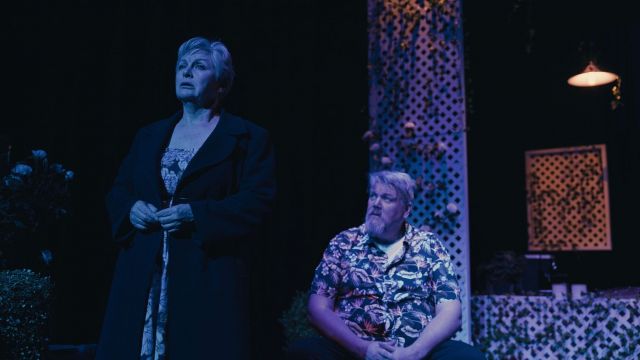Things I Know to be True
A 3am phone call carries the same possibilities as Schrödinger’s cat in its box. Is it possible to walk away from either and not know what there is to know?
Things I Know to be True opens with middle aged Bob Price arrested at the moment of answering the phone. Over two acts, encompassing four seasons of the year, the accumulation of circumstances leading to this moment is revealed.
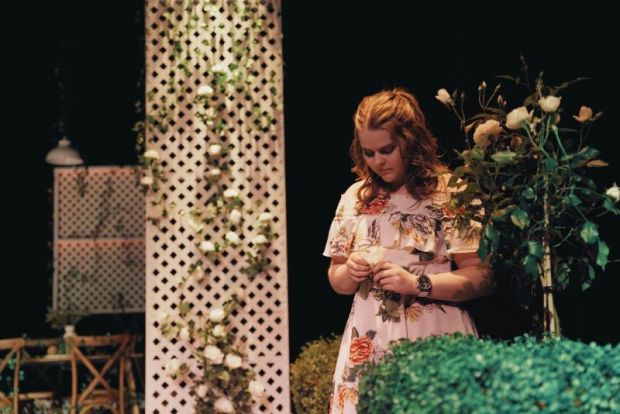
The Price family bicker, tease, joke, and tell stories as all families do. Bob is inept with the new coffee maker, the children cringe when their parents talk about sex, car keys are dropped in the one particular bowl on the kitchen bench. The Prices are normal and relatable. They could be us.
Like cells in a Petri Dish they unite and divide, triangulate and separate, lattice like and organic. The set of trellis and vines, supports this notion of of the family as animate and interconnected. There are favourites and there are resentments that ebb and flow with the seasons.
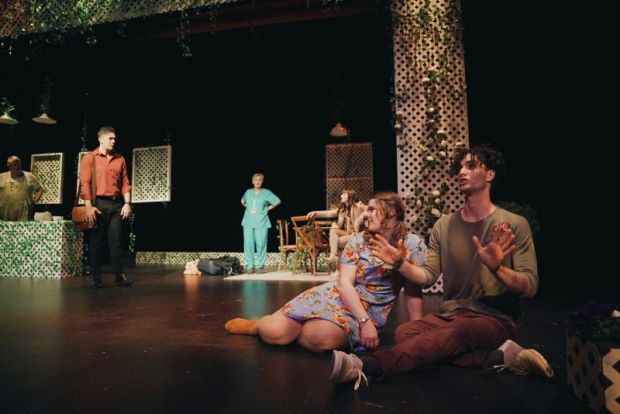
The evolution of the year is supported with evocative light and a sound scape redolent with bird song (as the nest fills and empties). The roses bloom perennially but Fran’s nursing scrubs reflect the cool blues of winter and the warmer hues of spring and summer. The soundtrack facilitates tension and pace as does the one original song of the piece. This moment of beauty flows naturally in a script that moves easily between dialogue that is real and authentic to stylised and choregraphed moments of choral speaking, to monologues of poetry and pathos. The Prices are all at once individuals with complex inner lives and a coalition of shared values and experience, occupying a space where personalities and perspectives sometimes rub uncomfortably against each other. This is all underpinned by excellent direction. There is a dance like quality to the movement. Physical conflict is adroitly managed. Intimacy is genuine. The coalescence of light, sound, set and direction is well considered.
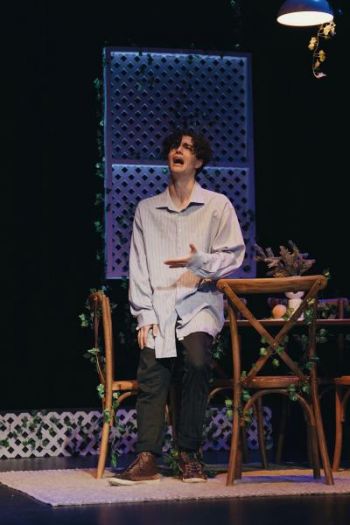
The casting is excellent, and every actor gives a powerful and sympathetic performance.
Bob and Fran Price are played respectively by Cameron Hindrum and Amanda Dawes. Both are solid and reliable presences for their children, with Fran, ostensibly the firm one who lays down the law, married to Bob, the genial but slightly lost bloke, retrenched and obsessed by his back yard rose garden.
Amanda Dawes makes Fran Price warm but feisty. She is perennially tired and overworked yet still has time to wash and iron for her eldest boy and mind the grandchildren. Fran is also playful and human as well as angry and cruel. Amanda Dawes, in this demanding and pivotal role, reminds us that every mother was once a young woman herself.
Katie Hill is Pip, the married daughter who seems to have made a success of her life. Pip and Fran have a prickly relationship, the fruit of blame, resentment and jealousy. Pip is a self-contained and reticent character who would rather not give her mother the satisfaction of insight into her tortured soul. Revelation comes in the form of monologues and, later, a letter. Hill delivers a fragile Pip, who is more like her mother than either realises.
Robbie Bleakley takes on the challenging role of Mark, the odd child, the outsider, the scrawny recluse. When Mark imparts news of life altering proportion, the family is shaken, and the limits of love are tested. The climactic scene of high emotion and choreographed violence, belies what the audience has come to know of Bob and Fran. Bleakley plays the gentle and conflicted Mark with delicacy and integrity. In the final scene, Bleakley is dignified and gracious. The moment of intimacy between Bob and Mark is one of the most moving of the show.
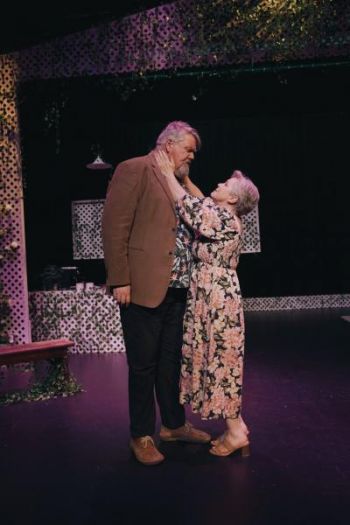
Lauchlin Hansen is Ben, Fran’s golden boy, the accountant who has made them all proud. Ben is shallow and self-absorbed, but Hansen gives Ben vulnerability and charm. Ultimately, Ben is as deluded as the rest of the family. Yet again, the limits of love are tested; one parent is prepared to defend and protect while the other is moved beyond the bounds of tolerance. Hansen plays Ben as hapless and foolish, but winsome enough for sympathy to be maintained.
It is Ashely Eyles as 19-year-old Rosie, who, gives the play its title. At the beginning of the first act, Rosie returns from a solo trip to Europe, hoping that she would come back a different person, confident and grown up. When things turn sour overseas, Rosie recites the things she knows to be true – dictums on which a life can be built. Rosie retreats to where is she safe, known and loved. Eyles is bright and naïve and sweet as Rosie. She is undoubtedly the baby of the family and (my) favourite. It is a shame that she is forced to grow up.
These delightful characters are the result of a strong script in which nothing is wasted or excessive. The direction is intelligent. Whilst there is unity of place, time progresses unabated though a coherent coalition of sound and light.
This excellent script by Andrew Bovell, was well chosen by Three Rivers. The considered coalescence of all elements made for a moving and enduring audience experience. No-one wants to pick up the phone but not knowing if the cat is alive or dead is worse.
Anne Blythe-Cooper
Photo credit: Luca Schild.
Subscribe to our E-Newsletter, buy our latest print edition or find a Performing Arts book at Book Nook.

